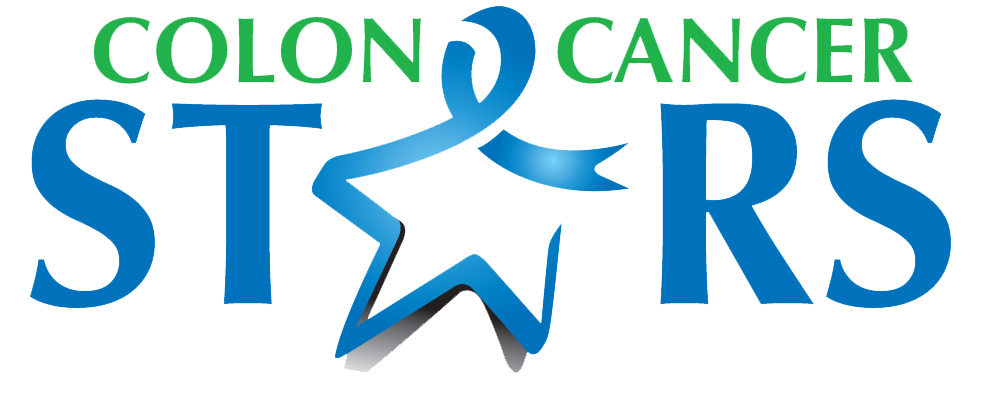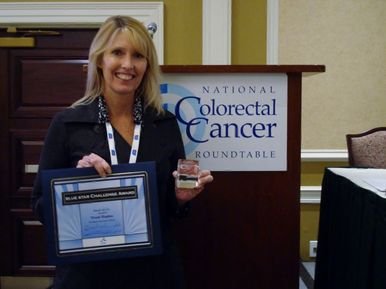Dress In Blue Day Pioneer Anita Mitchell is February 2014's Hero of the Month
February's Hero of the Month is Anita Mitchell, a stage IV colon cancer survivor, the founder of Dress in Blue Day (which is coming up on March 7th) and longtime advocate for several colon cancer organizations. Anita was kind enough to answer a few questions for us.
Exact Sciences: Tell us a bit about yourself. What is your personal connection to colon cancer?
Anita Mitchell: I lost my father to colon cancer when I was 16 and a good friend when I was 33. Then at age 41 I was diagnosed with Stage IV [colon cancer]. I went to my primary care doctor with blood in my stool and change in bowel habits not having any idea that they were symptoms of colon cancer. I was told by my doctor that I didn’t need a colonoscopy.
Four months later, when symptoms grew worse, I looked them up in a medical encyclopedia. I called my mom to confirm what my father’s cancer type was. I discovered it was colon cancer. I went back to my primary doctor and demanded a referral for a colonoscopy. The gastro-intestinal doctor didn’t event biopsy the tumor during the colonoscopy; he said it was obviously cancer and off to a surgeon I went. After a scan It was determined I was stage IV with seven tumors scattered throughout my liver.
I ended up having two surgeries; first one removed a foot and half of my colon and a ovary and sixteen lymph nodes. Then as soon as I healed from my operation, I started on aggressive chemotherapy regiment to try and shrink the tumors in my liver to a more manageable size. I was lucky, after five months of chemotherapy, I was able to have my second surgery and have my liver re-sectioned to remove three tumors and have radio frequency ablation to get the five remaining tumors. More chemotherapy followed for another year and half and I have been clean since.
There isn’t even follow up guidelines for people like me. It’s a good problem to have and I am very thankful. I feel like I was suppose to do something with all I had been through. To have lost people close to me but not know anything about colon cancer, and then to get it myself seemed like God was calling me to make a difference.
To have lost people close to me but not know anything about colon cancer, and then to get it myself seemed like God was calling me to make a difference.
What are you doing to raise awareness of this disease?
I was a model on the 2007 Colondar put out by the Colon Club.
I testified to help pass a bill here in our state that mediated insurance companies to cover colon cancer screening.
I also started a non-profit Colon Stars to help continue work started from a state task force I was on. We are all-volunteer and focus on awareness, education patient support and resources.
It is not uncommon to see me dressed like Polly the Polyp; giving tours through the inflatable colon in a mall or even at a school. We believe education can start at any age and we can learn and share with our families. I [also] run a support group for colorectal patients in Seattle [and] attend patients' appointments on request.
Are there any other organizations you’re a part of?
I am a board member for Alive n Kickin and Chris4life/ColonTown, on the advisory council for ColonTown, a past model for Colon Club, and a buddy for Colon Cancer Alliance. I've lobbied for Fight CRC. I'm a Fred Hutchinson Cancer Centers survivorship council member and a Washington State Survivorship, Palliative Care and End of life committee member. I have also been a delegate for Livestrong and the American Cancer Society in the past.
Wow! How do you find the time for all these projects?
I have been at this for 8½ yrs. so I have helped when I can and when it feels right. I like to stay involved. It helps me know what resources are out there for patients nationally and share those here in Washington State with the people I work with.
In your opinion, why is it important for people to be educated about the disease and the prevention methods?
I think people just don’t realize how common it is and that it has no symptoms until late stage, so the only way to prevent it is with screening. Screening really is the key. Most cancers aren’t preventable; this one is. We could really change the numbers and the lives lost. It is sad to me that it is second-leading cancer killer.
Screening really is the key. Most cancers aren’t preventable; this one is.
Now the medical community is beginning to see an increase in younger people getting it, so people really need to know what the symptoms are since they aren’t screening specifically by age.
Lastly, what is one thing that you would like people to take away from your story?
Know the symptoms, know your family history, and know that having a colonoscopy is much easier then chemotherapy! Know that if we together encourage family and friends to get screened we can help reach our national and united goal of 80% screened by 2018. This is a preventable, treatable disease!

